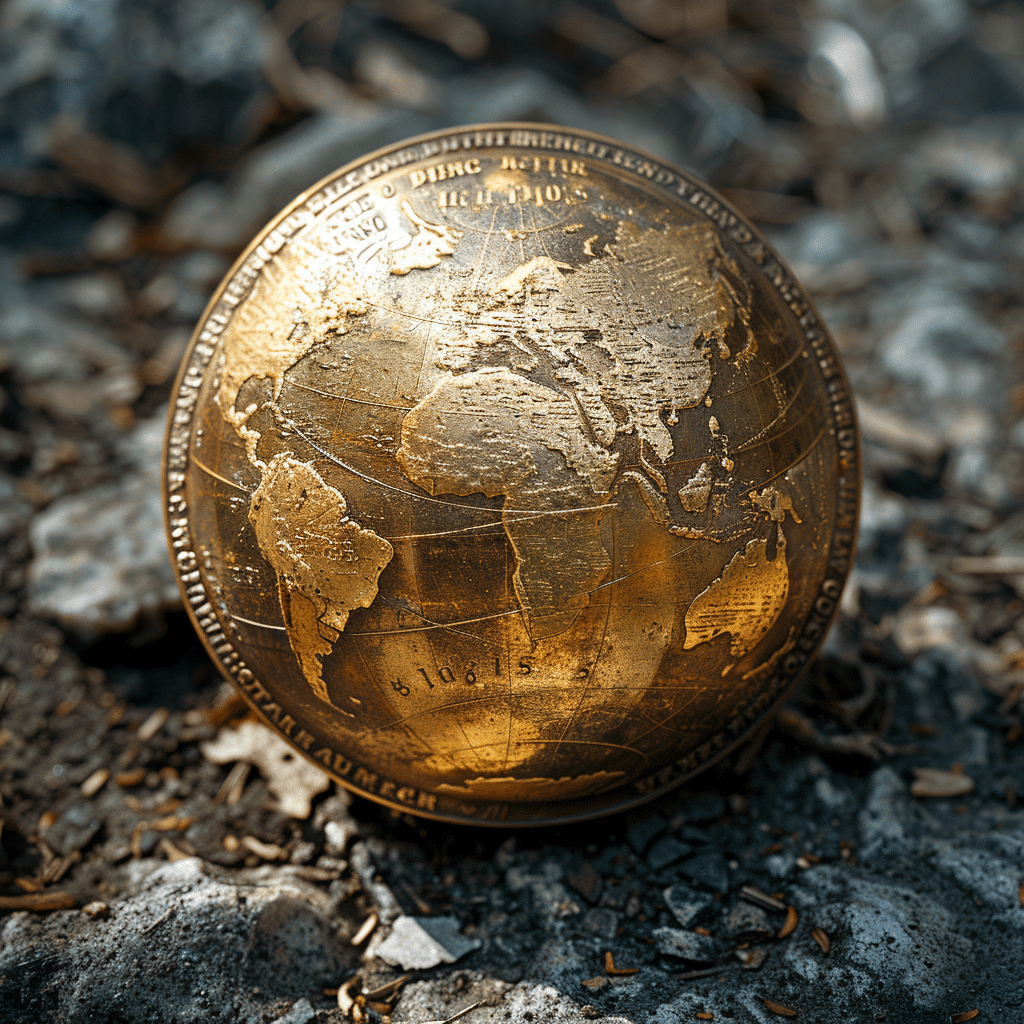Inflation – it’s a word that’s been on everyone’s lips, and for good reason. In a world where the cost of a latte can suddenly spike or your mortgage might feel like it’s playing hopscotch with your budget, it’s no wonder the question “when will inflation go down” has become a refrain echoing in homes and boardrooms alike.

Understanding the Current Economic Climate and Predicting When Inflation Will Go Down
As we’ve all felt in our wallets, the inflation rate has been as unpredictable as spring weather since 2023. With numbers bouncing around, it’s hard to pin down when those rates will take a breather. But here’s the scoop: closer attention paid to key economic indicators like employment rates, GDP growth, and consumer spending could give us a hint. These are the thermometers and barometers of our economic weather system.
On the one hand, more jobs and fat paychecks mean people could splurge more. Yet, if everyone’s spending like there’s no tomorrow, demand outpaces supply, and voilà – prices rise. Throw in a pinch of analysis on recent fiscal and monetary policies affecting inflation, and you’ve got yourself a full plate of factors that strategists and economists are juggling to foresee when inflation will go down.

Historical Insights: Reflecting on Past Inflation Trends to Gauge Future Trajectories
If history teaches us anything, it’s that it loves to repeat itself—just like that Skata song you can’t get out of your head. Looking back at historical inflation patterns and economic cycles can prepare us for future turns. Post-recession inflation behavior, in particular, does a good job of reminding us that economies can be as resilient as a comeback kid on a sports team.
And let’s not forget the lessons learned from past Federal Reserve actions and inflation control measures. They’ve pulled some strings before—tightening here, loosening there—to try and keep inflation on a short leash.
| Factor Influencing Inflation | Current Indicators | Potential Impact on Inflation | Projected Timeline for Decrease |
| Federal Reserve Policies | Increasing interest rates | High interest rates can cool off economic activity and decrease inflation | Dependent on economic data; many analysts expect some effects within 6-18 months |
| Supply Chain Improvements | Progress in resolving disruptions | Smoother supply chains can reduce costs and thus decrease inflation | Highly variable; some improvements can have immediate effects, others will take years |
| Energy Prices | Fluctuations depending on the global market and geopolitical events | Lower energy prices can lead to lower transportation and production costs, potentially reducing inflation | Can change rapidly with global events; unpredictable |
| Labor Market Conditions | Unemployment rates, job growth | A tighter labor market can lead to higher wages, which can increase inflation; conversely, relaxation could help reduce inflation | Long-term trend; could take multiple quarters to see change |
| Global Economic Trends | Economic growth or slowdown in major economies | Slowdown in major economies could decrease demand and inflationary pressure; growth could have opposite effect | Medium to long-term; subject to rapid changes in global events |
| Government Fiscal Policies | Budget deficits/surpluses and spending | High government spending can spur inflation, while austerity could help reduce it | Dependent on political decisions; could take effect over several years |
| Consumer Sentiment | Measures of consumer confidence and spending | Reduced consumer spending can lessen demand-pull inflation | Short to medium-term; highly responsive to current events |
| Technological Advances | Innovations that improve productivity | Increased productivity can lead to lower costs and lower inflation | Long-term; ongoing progress with sporadic significant impacts |
The Role of Government Policy in Easing Inflationary Pressures
The government’s not sitting on its hands, though. There are existing measures aimed at reining in the bucking bronco that is inflation. Top-notch economists often chime in on the effectiveness of current fiscal policies. Is Uncle Sam’s medicine cabinet equipped with the right remedies to stabilize prices? And hey, don’t count out those proposed legislative changes either; they have the potential to turn the tide.
Sector-Specific Analysis: How Different Industries Predict When Inflation Will Go Down
Real estate. Healthcare. Education. Technology. These aren’t just buzzwords; they’re industries with their own inflation tales to tell. Diving deep, we’ve got industry leaders sharing how rising costs have thrown a wrench in their operations and pricing models like a real-life game of Tetris.
And here’s a ray of sunshine: improvements in supply chains across these markets could be the secret sauce in simmering down inflation rates.
Global Economic Influences on Domestic Inflation Rates
It’s a small world, after all, especially regarding economics. International events like a seesaw in oil prices or a tussle over trade relations can send ripples across our ponds. The crystal ball economic forecasts from international finance wizards often highlight the delicate dance of domestic and worldwide trends.
There are also nifty case studies on how other countries are putting the brakes on inflation, giving us a peek into their playbooks. Could these strategies be the golden ticket?
The Impact of Innovations and Market Disruptions on Inflation Dynamics
New gadgets and gizmos, a.k.a. technological advancements, might be our knights in shining armor, potentially sparking productivity and putting inflation in check. But wait, there’s a new kid in town: digital markets, including those cryptocurrencies everyone’s gabbing about. Could they stir the pot and revolutionize inflation patterns?
Oh, and let’s not overlook those unpredictable market disruptions. They can swoop in like a plot twist in your favorite soap opera, changing the inflation narrative in the blink of an eye.
Expert Predictions: Economic Authorities Weigh In On When Inflation Will Go Down
When it comes to when inflation will go down, the Federal Reserve and central banks are like the Gandalfs of the financial world – wise and all-seeing. Their predictions are eagerly awaited like the next season of your favorite show. And they’re not alone; financial institutions like JPMorgan Chase and Goldman Sachs toss their hats into the forecasting ring, along with top economic professors who can spin theory into a crystal-clear analysis.
Consumer Behavior and Its Influence on Inflation
Let’s talk about us, the regular Joes and Janes. Our feelings toward inflation and spending habits are more potent than we think. Survey says: consumer sentiment is a force to be reckoned with. Saving and investment trends during inflation’s high tide are like watching the ebb and flow of the ocean—constantly shifting. And boy, does consumer confidence play a big role! It’s like having the crowd behind you; it can help speed up the return to comfortable price levels.
An Innovative Wrap-Up: Moving Forward with Inflation Awareness
Let’s wrap this up with a neat bow, shall we? We’ve sifted through the expert insights and data on inflation trends like a miner panning for gold. For folks and businesses alike, developing strategies to weather the inflation cycles is as crucial as your morning cup of joe.
In the end, it’s all about staying informed and proactive as we navigate the rippling seas of our economy. A question like “when will inflation go down” isn’t just about numbers—it’s about preparation. Managing a mortgage in these times can feel like navigating treacherous waters, but with insights like these and solid resources like understanding why are interest rates going up or will interest rates go up, you’ll be ready to sail smoothly towards calmer financial horizons.
When Will Inflation Go Down: Entertaining Insights into Economic Patterns
Ever pondered why seemingly non-related things could hint at when inflation might ease up? Let’s take a quirky wander down trivia lane and see what bizarre connections we can make! For starters, think about when interest rates climb as high as the sky, and you can’t help but wonder, as you do while humming Rises The moon Lyrics,Why are interest rates so high? Well, high-interest rates can be like the headstrong protagonists in horror flicks—despite all red flags indicating trouble, they insist on sticking around a bit too long. Much like how the pet Sematary 1989 cast found themselves cursed with lingering spirits, economies can be haunted by lasting inflation.
Transitioning from haunted graveyards to shiny distractions, who knew that wearing gold hoops might have more to do with your wallet than just fashion sense? Precious metals like gold often see a surge in value during times of high inflation as people scurry to safeguard their savings against a weakening currency. It’s a bit like saying “Keep your friends close, but your gold hoops closer, isn’t it? Plus, in the world of finance, the term Ftmi—which stands for ‘for the most information’—is definitely not about trivia but underlines the importance of being well-informed during tumultuous economic times.
So, next time you overhear someone talking about inflation at a dinner party, you could totally drop a quirky fact—or better yet, redirect them to a good read on the topic! After all, knowing when inflation will decline might not just be in the books but could appear in the most unusual conversations, nestled between discussions of classic horror movies and the latest fashion trends. Keep your eyes peeled and your mind open, because the clue you need could very well be disguised in the least expected chit-chat!




